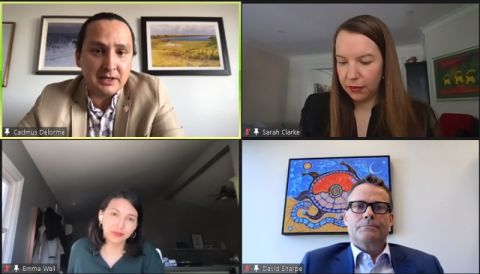
“We approach our services by striving to replace intergenerational trauma with intergenerational transfer and move children from being survivors to dreamers.” These are the words of Chief Cadmus Delorme of Cowessess First Nation in his March 15 virtual discussion with the Queen’s Law community.
In his talk, “Indigenizing Child and Family Services,” he looked at the evolution of the Miyo Pimatisowin Act that established Cowessess’ jurisdictional sovereignty over their children and families that require protection and prevention support, as well as holistic measures aimed at addressing intergenerational trauma.
Cowessess First Nation, he explained, is made up of Cree, Saulteaux, Métis, and Nakota people in southern Saskatchewan. The First Nation has identified three pillars – economic self-sustainability, political sovereignty, and cultural rejuvenation – that intersect with the issues of agency and sovereignty within the child welfare system.
When Delorme was first elected chief in 2016 (he was re-elected in 2019), he visited children from Cowessess who were in various forms of care. Observing an absence of a “kinship clan” or “cultural plan” in that they were not aware of their cultural identity or heritage, he established quarterly rejuvenation gatherings, where they welcomed foster children in care and their families to Cowessess to share in heritage teachings.
This process also informed Delorme’s advocacy mission, as he examined the historical rationale for the governments to have domestic sovereignty and jurisdiction over child welfare, saying, “We can try and work under the provincial system or we can just code it from ground zero, outwards, which gave birth to the Miyo Pimatisowin Act. That Act, ratified in March 2020, asserts Cowessess’ sovereignty over their children and families that require protection and prevention support. Combining “Miyo” (related to higher power or greatness) and “Pimatisowin” (striving for something better), he said, means that children are the gift of the Creator and it is a tribe’s collective responsibility to strive for a better life for children.
The federal government’s Bill C-92, An Act respecting First Nations, Inuit and Métis children, youth and families, came into effect in January 2020, affirming the jurisdiction of all Indigenous peoples with regards to child and family services. “Bill C-92 was perfectly timed with our approach,” he said.
Noting the importance and power of words in administering children and family support, he spoke of how the community is moving away from terms like “social worker” or “foster child” and titles that may still carry colonial meanings.
The Chief Red Bear Children’s Lodge, he described, gets its name from ancestral heritage, and offers a constructive, safe space, where the community runs preventative and protective services aimed at addressing things like intergenerational trauma by taking a “vertical values approach,” to re-establish values that may have been severed in generational transfer by the residential school system. He also spoke to the importance of the creation of the Eagle Woman Tribunal Council, their own judicial system that oversees the Miyo Pimatisowin Act and Cowessess legislation, and provides guidance on civil matters and manages grievances and disputes.
The event closed with a Q&A, during which the Chief addressed a number of questions posed by attendees.
Participating in the event were Dean Mark Walters, who delivered a land and territorial acknowledgment; Professor Nick Bala, Law’77, who has done research and teaching on Indigenous child welfare and introduced the session; Rachel Hay, Law’21, who introduced the Chief; Sarah Clarke, who teaches Aboriginal Child Welfare Law at Queen’s and moderated the discussion; and Emma Wall, Law’22, who facilitated the Q&A.
Learn more about Chief Delorme, the Cowessess First Nation on the Cowessess website.
— Tim Butters